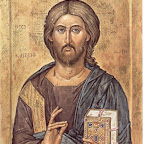GREAT MIRACLE GIVEN BY GOD ONLY TO THE ORTHODOX CHURCH
This ceremony takes place in the Orthodox Church of the Resurrection in Jerusalem in such a way that bewilders the soul of the Christians.
On Easter Saturday, at noon, the Orthodox Patriarch, or any other Orthodox Archbishop, enters the Holy Sepulchre, recites special prayers and remains waiting. Sometimes the waiting is long, sometimes short. The crowd, in the darkened church, repeats continually with a loud voice: "Lord, have mercy." (Kyrie eleison). At a certain moment the Holy Light flashes from the depth of the Holy Sepulchre in a supernatural way, miraculously, and lights up the little lamp of olive oil put on the edge of it. The Patriarch (or the Archbishop), after having read some prayers, lights up the two clusters of 33 candles he is holding, and begins to distribute the Holy Light to the multitude of pilgrims, who receive it with great emotion, accompanied with the pealing of bells, acclamations, and an unbridled enthusiasm.
The Holy Light is not only distributed by the Archbishop, but operates also by itself. It emits from the Holy Sepulchre having a gleam of a hue completely different from that of natural light. It sparkles, it flashes like lightning, it flies like a dove around the tabernacle of the Holy Sepulchre, and lights up the unlit lamps of olive oil hanging in front of it. It whirls from one side of the church to the other. It enters to some of the chapels inside the church, as for instance the chapel of the Calvery (at a higher level than the Holy Sepulchre) and lights up the little lamps. It lights up also the candles of certain pilgrims. In fact there are some very pious pilgrims who, every time they attended this ceremony, noticed that their candles lit up on the own accord!
This divine light also presents some peculiarities: As soon as it appears it has a bluish hue and does not burn. At the first moments of its appearance, if it touches the face, or the mouth, or the hands, it does not burn. This is proof of its divine and supernatural origin. We must also take into consideration that the Holy Light appears only by the invocation of an Orthodox Archbishop. EACH TIME THAT HETERODOX BISHOPS TRIED TO OBTAIN IT, THEY FAILED.
Once the Armenians paid the Turks, who then occupied the Holy Land, in order to obtain permission for their Patriarch to enter the Holy Sepulchre, The Orthodox Patriarch was standing sorrowfully with his flock at the exit of the church, near the left column, when the Holy Light split this column vertically and flashed near the Orthodox Patriarch.
A Moslem Muezin, called Tounom, who saw the miraculous event from an adjacent mosque, abandoned immediately the Moslem religion and became an Orthodox Christian. This event took place in 1549 under Sultan Mourad IV, when the Patriarch of Jerusalem was Sophrony II. ( The mentioned split column still exists. It goes back to the XII c. The Orthodox pilgrims embrace it at the "place of the split" as the enter the church).
The appearance of the Holy Light is an event which occurs every year in front of thousands of visual witnesses. Nobody can deny it. On the contrary, this miracle can reinforce those who have lack of faith.
There are some very touching recent cases of some Jews, who believed in Christ after having seen the Holy Light, and who said to their compatriots: "Why are you still waiting for the Messiah? The Messiah came indeed".
from Irene Econimides book "Differences between the Orthodox and Roman Catholicism"


Niciun comentariu:
Trimiteți un comentariu